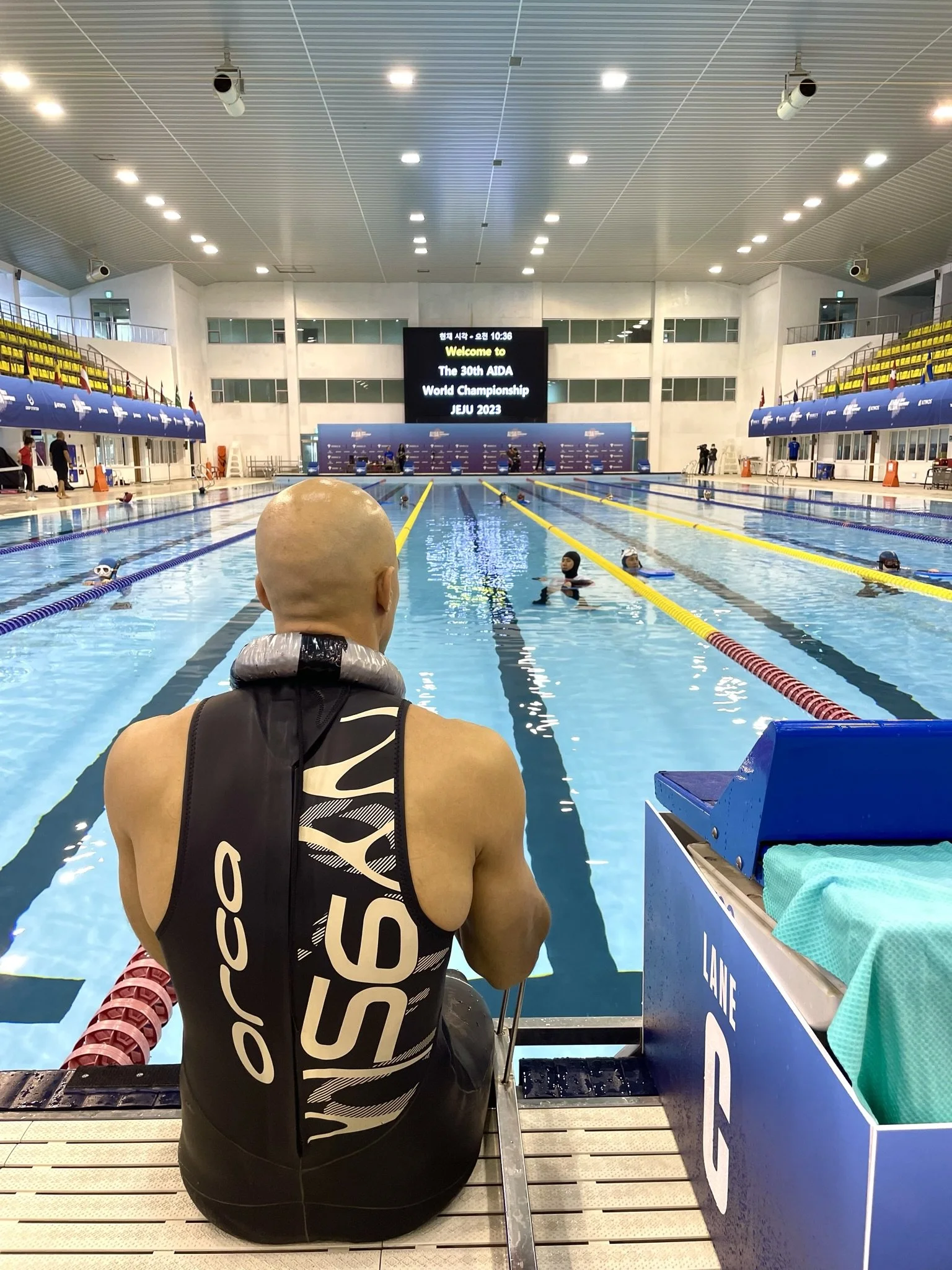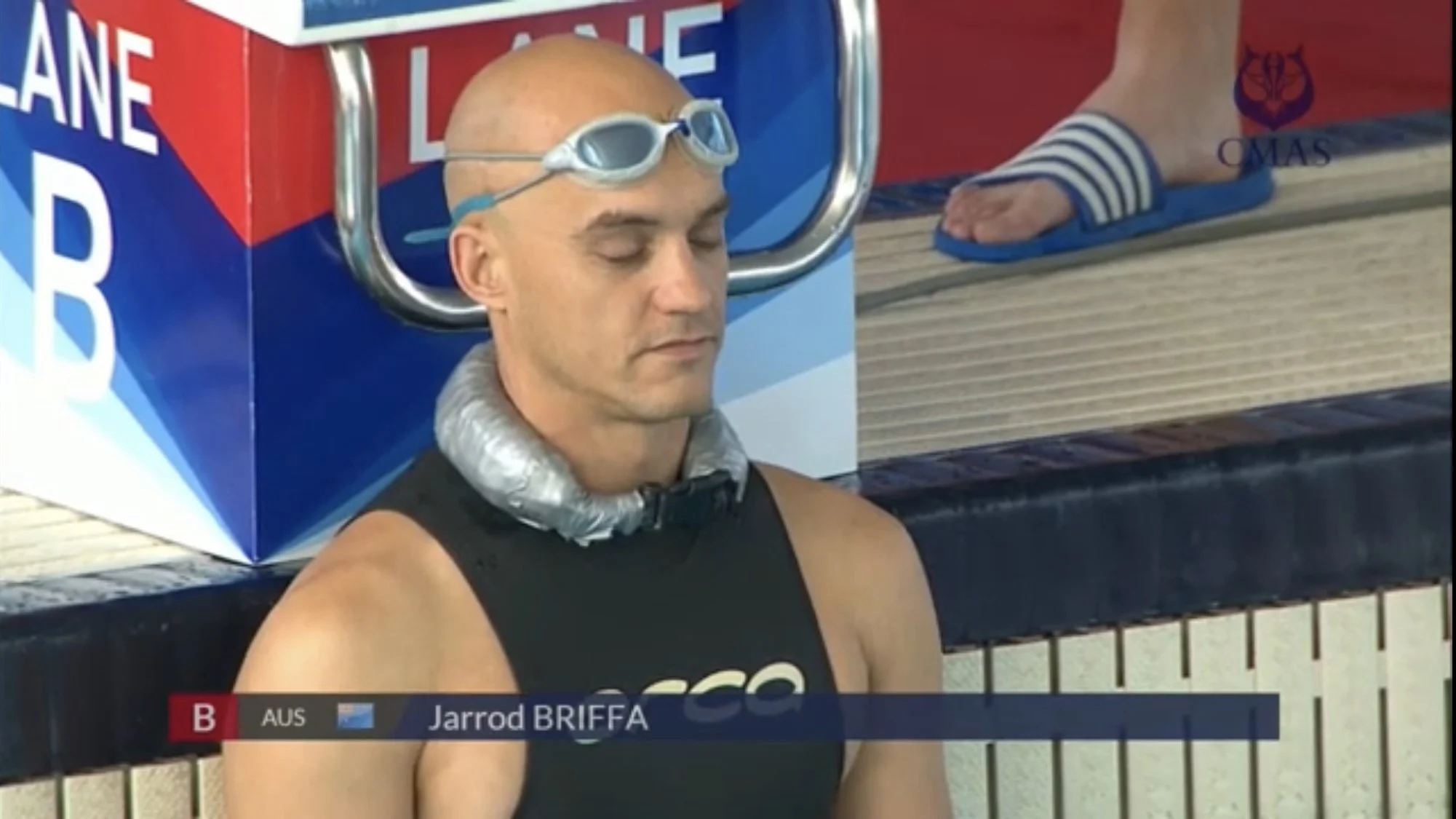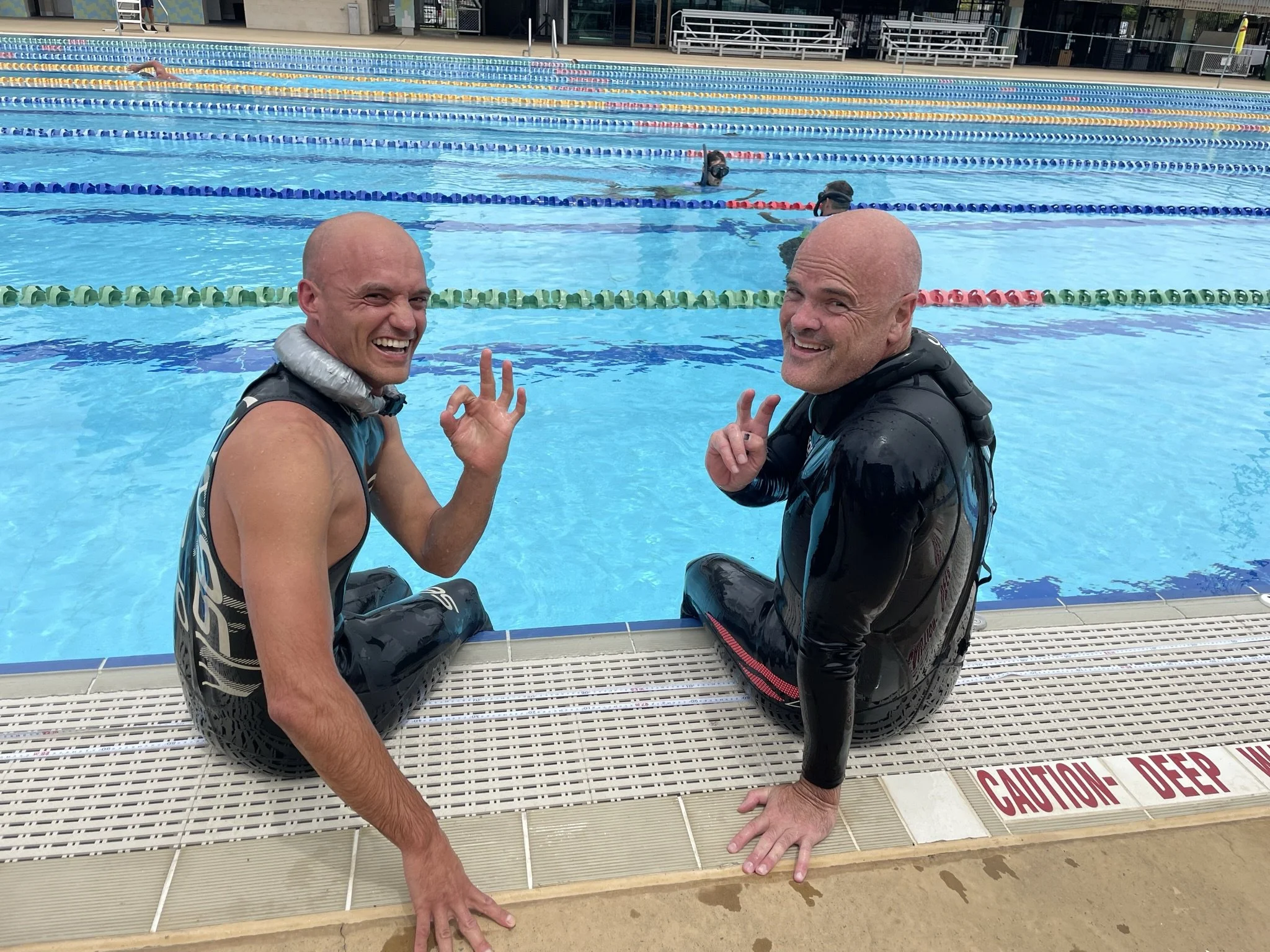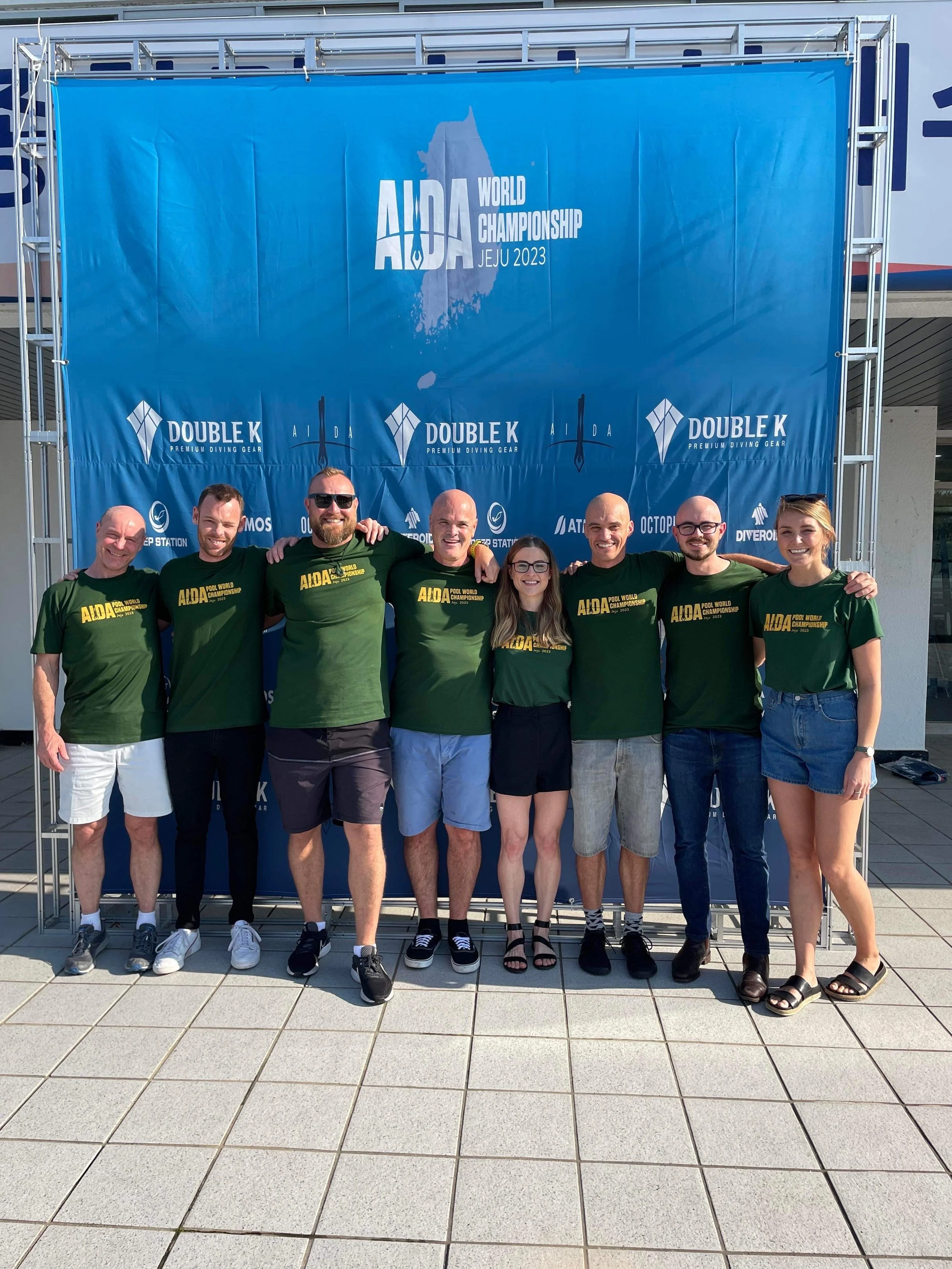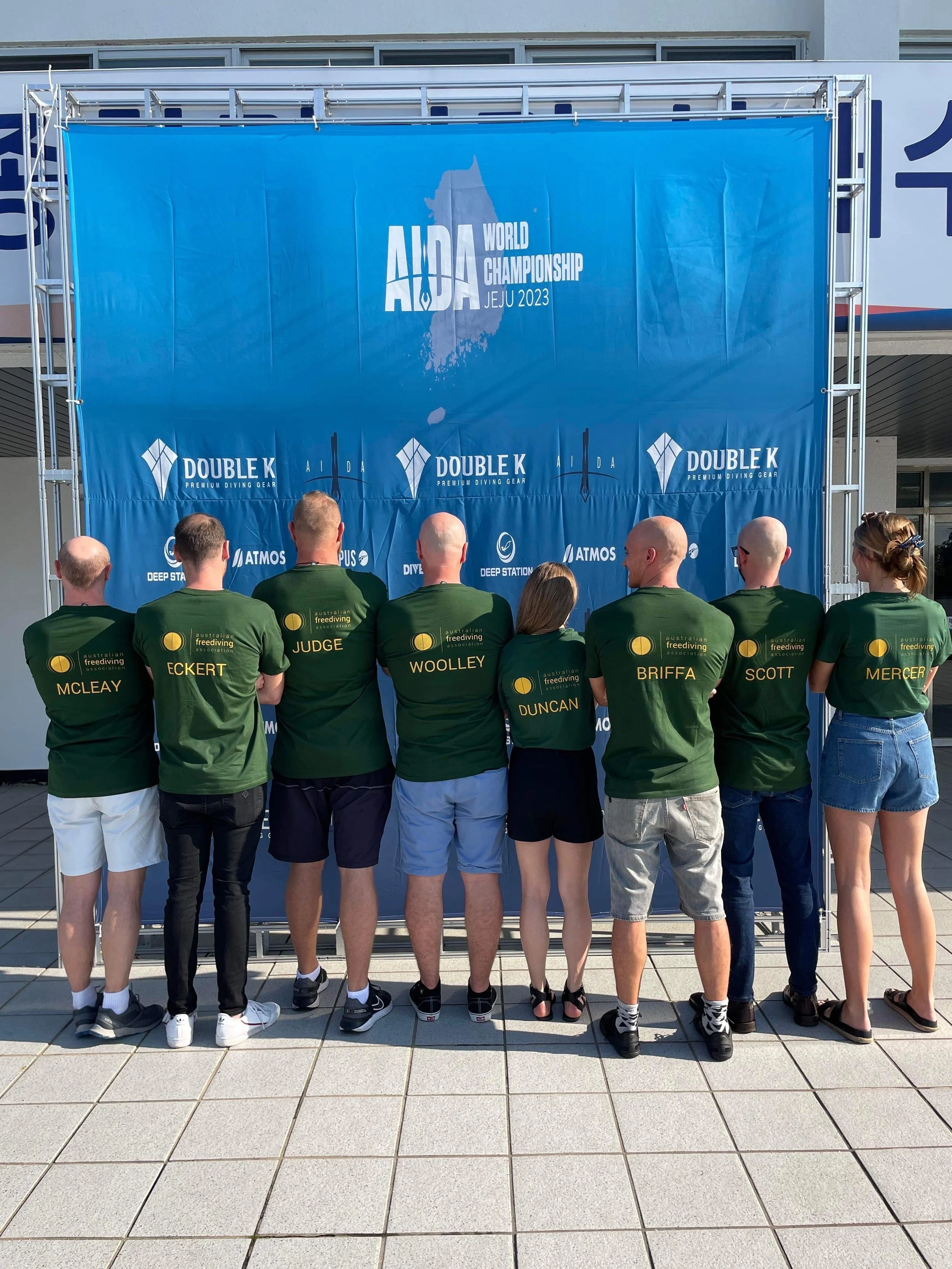A big F U to the ego
When I competed in my first freediving competition back in 2017, I remember being blown away by the hidden potential I had discovered. It was this realisation that has fuelled my progress in the pool, both then, and now. This honest discovery and uncovering of layers of potential is personal and can be a humble experience. But as pure as that pursuit is, at some stage the ego joins in for a conversation and the ego is anything but humble. The ego is focused on the outcome and employs cunning strategies to sabotage your performance, taking your focus away from the present moment and preventing you from achieving a state of flow. Whether you know that a big dive means beating your training buddy or breaking a National Record, if you dive with this in your mind it is impossible to do the perfect dive. One of the biggest skills I have played with during my freediving journey is the ability to “let go of the need to succeed”. It has become a mantra for me and I have even written it on my fingers at times as a reminder. I have had several failures with this and the ride is not linear, but I continue to gain a deeper understanding of these lessons with each competition. In doing so I hone my ability to perform under pressure, both in the pool and in life.
Join me below to explore my learnings from a few different competition dives over the last few years..
2018
Back in 2018, I had no interest in records, or even knew they existed. After seeing heaps of inspiring performances at my first comp and uncovering new layers of my own potential, I discovered that the Australian Dynamic record was set by Tanc Sade at 218m back in 2012. It was a record that had stood the test of time as no one seemed that close to breaking it six years later. I remember googling Tanc Sade and finding a clip of his dive on youtube, as well as some clips of “The Gilmore Girls” that he starred in. Watching his dive for the first time my mind was blown.
This dive seemed massive and hard to comprehend. I remember searching google with questions like “how long can Tanc Sade hold his breath?” to try and understand how he swam that far. I watched his swim countless times in minute detail to break down what was happening. How did he start? How did he turn? How many kicks did he do per lap? What were his lap times? My mind had seen something but my brain was still trying to compute how this was possible and if he was just some outlier with crazy abilities.
After watching these types of videos hundreds of times, dives like Tanc’s became imprinted in my mind and with each new phase of training I started to believe in my own abilities a little more. In my mind's eye I began to see myself swimming to 200m…..and beyond.
Australian Freediving Pool Nationals 2019
At Nationals in 2019 I was hoping to do my first 200m swim. I had been close to this in training and was hoping that things would come together on the day. I remember telling myself that without doubt I could do this swim. I was confident, maybe over confident, and my body was strong. My ego had started to creep in. It is important to be confident, but it is also important to be present in the performance. The ego focuses on the result but in a big performance we need to be in the moment. If I have learned anything in the years since then, it is that the ego has incredible powers of sabotaging long dives. So many freedivers perform amazing dives in training when they don’t expect it and then find themselves coming up hypoxic on sub-maximal distances in competition. There are several reasons for this, like overbreathing before the dive, but something that is often overlooked and more emotional is that when you have a need to succeed you build up muscular tension, the heart rate increases and you have a sympathetic activation (fight or flight). This is not ideal when you are trying to conserve oxygen on your dive.
On my dive at Nationals in 2019 I started the dive totally in the zone. I considered the start to be perfect, I was feeling the water and half asleep. This is a nice way to start long dives but it is important at some point to focus your attention back on your level of hypoxia. Lots of the time when people finish the dive with loss of motor control or black out, it is because they were not aware of their hypoxic symptoms or they let the ego take control and they left it too late to check back in. It might work in other sports to let the ego lead the way, but in freediving I have seen it sabotage more dives than not. On my dive at Nationals in 2019 I had a feeling going into the dive that I would “send it”. That, luckily, all dissolved when I swam into the wall at my first 50m turn. I had so much confidence and was so asleep that I didn’t notice the T until I was almost at the wall and I did this funky turn as my body crumpled into the wall. This totally woke me up from my slumber and shattered my confidence that a big dive was possible. I started thinking I could come up now as the dive was already ruined - I was never going to do a big dive after this. I decided to try and relax and see if I could soften my body again and keep swimming and I would just come up at 100m. This brought me back into the present moment and I kept checking if I was feeling relaxed and had any hypoxic symptoms. As I got close to the 100m wall, I realised I was still ok and whilst I was not going to do a big dive I could keep swimming beyond 100m. The ego had dissolved the moment I hit the 50m wall and now, rather than mentally focusing on the end of my dive that would cause tension, I was back in the present moment with no expectations about how far I would swim. With this mindset and approach the dive continued and I was surprised when I reached the 200m wall and was still ok. I received a white card and a new level of potential was realised.
Jarrod Briffa and Amber Bourke are National Champs in 2019.
Fast Forward to the CMAS & AIDA Pool World Championships 2022.
Not being physically or mentally ready for the World Championships in 2022, but competing anyway, was the first big F U to my ego. Knowing that I would be competing on a world stage and performing sub-optimal dives was one of the best decisions I have made. I contemplated not going if I was not in shape but then I thought stuff it. COVID helped us view these kinds of decisions a little differently. When you realise you might be landlocked, or even suburb-locked, like we were in Melbourne from 2020-2022, you make the most of the opportunities you have. Being at the World Championships and knowing you are not in form and can only do the dive you are capable of on the day, was humbling and helped me to be present and surprisingly even make a few PB’s despite my lack of form and illness during the competitions. Up until the last day of competition I had approached each dive with an open and explorative mindset - ready to end the dive when I needed to regardless of the distance or time. Until then I had all white cards.
It was not until the last day of the AIDA WC that I let the ego creep in and ruin my last dive of the competition. I had done a PB in static the day before which gave me a massive confidence boost. If I could hold my breath that long I could definitely swim further, right? The night before the last dive of the competition I realised that this would be my last chance to do a big dynamic dive in competition for 6 months. My mind knew I could do it and I thought my body was ready enough too, but going into any dive with ego totally changes the way you perform. I had watched Tanc’s dive for years and my ego wanted me to do that dive. Ben Eckert had also recently exceeded Tanc’s record, with a dive to 223m in a competition in Brisbane. The ego told me “it’s now or never”, which is rarely true, and I went out like a bull at the gate swimming one of my fastest ever 200m, overtaking everyone in the heat in my race to the finish. This mentality of “sending it” meant that I ignored all sensations until after the 200m wall. I then realised I was becoming quickly hypoxic but it was way too late to make a decision quickly. I took a couple of kicks too far and was hypoxic when surfacing and dipped on my surface protocol. I received a red card and it was as if the dive never happened. I knew immediately my ego had sabotaged the dive, but it took me months to actually unpack how it got such a stronghold.
Brisbane teams comp 2023 (Pre-World Championships 2023)
After returning to Melbourne from depth training and holidays in late 2022, I started preparing again for the upcoming pool season. I was excited to have a lot more time to focus and train myself than I had ever had before. I contemplated getting a coach again as I had dabbled with it a few times before, but having so much time on my hands this training period (as I was essentially unemployed) I decided to train myself. I was coaching a few other people and I loved it, but it is a much harder task to train yourself. All those conversations you would normally have with the coach about your challenges and ways to overcome them, you have to have with yourself. It was tricky and time consuming at first, but over time it helped me to get to know myself much better. Rather than rely on someone else to prescribe the right training for me (which I believe is helpful when you are new or time poor) I was spending a significant amount of time each week planning my training, monitoring my rest, stress and energy levels, making sure I was eating the right foods and my blood work was healthy. I was lucky enough to have the support of Mel Breaseley at VERSUS Gym in St Kilda for strength and conditioning training as well as recovery facilities.
I got myself in good shape for the National Championships, but the focus was on the World Championships in June. I had performed some National Record distance dives in training in Dynamic and felt really consistent. I wanted to attempt a bigger dive in competition before the World Championships to test out some changes to my dive plan that I had been experimenting with. So I booked in with Angus McLeay, one of the people I coach, for the Brisbane Teams competition a few weeks prior to World Championships.
Heading up to Brisbane I knew I was capable of doing a National Record distance dive. I had well and truly outworked any self-doubt and I was confident that it would happen. I didn’t feel stressed or nervous about this but I was definitely over-confident. When we got to the pool I realised that the pool was very unusual with a boom sitting up 20cm from the bottom in the middle of the pool and a boom you could swim under at one end. There were jets that disrupted your glide in the side lane where the comp was run and I can’t be sure, but the water possibly had more salt than the pools I was used to as I felt very buoyant. I swim without goggles to get a stronger dive response (slowing of the heart rate and conservation of oxygen) so avoiding obstacles in the pool is a bit harder and more stressful due to the blurred vision. All of these things scream caution and the importance of having a trial run in the pool before the big swim. But my ego was too strong. I shrugged them off as minor annoyances and convinced myself that they would not affect the outcome much and I could just jump in the pool and do the dive as I had in training.
On the day I started the dive with confidence, I needed to be careful not to swim too low to the bottom so I wouldn’t hit the boom in the middle. When I took off from the wall I felt like I was floating towards the surface, so I stopped gliding so much between kicks and begun kicking more frequently to stay underwater. I was on constant lookout for the next obstruction and was never able to get into a relaxed state. I had planned to swim about 4 seconds faster per lap than my previous comp times, aiming for 42 seconds per lap. After speeding up to address the buoyancy issue, I was now swimming at 37-38 seconds per lap. This pace is way too fast for me on these longer swims and I became hypoxic very quickly towards the end of the dive. At around 2 minutes and 50 seconds I surfaced at 220m and had a surface blackout whilst trying to perform the surface protocol. To put in perspective the time and distance, my previous 217m dive took 3 minutes and 24 seconds. It was just the wake up call I needed. After the swim a little voice in my head said, “If you dive with your ego, then you are never going to finish your dive”. I knew what went wrong and I was so grateful for this experience before the World Championships. But did I have the skills to prevent it from happening again in the next competition? I knew I needed to let go of the need to succeed.
AIDA Pool World Championships in Jeju 2023
I had trained well for the World Championships and I was so excited to be there with a ripper Australian team. My training had focused on the dynamic disciplines, but the one I was most excited for was dynamic with mono-fin on the last day. I had not attempted another big swim in Dynamic since my surface blackout in Brisbane, but it had not impacted my confidence. I decided not to do another big swim in Dynamic to prevent the ego from getting a stronghold again. By not doing another big swim in Dynamic before the World Championships, I would create some uncertainty that would encourage me to be present in the dive and not get ahead of myself. For some people it is important to use tactics to build confidence, for someone overconfident maybe it is useful to introduce a little doubt to make them more present.
On the day of Dynamic I was confident and excited, but totally ready to fail. I had no doubt that I could achieve what I wanted and was also comfortable with the fact that today might not be the day and that too was ok. I had my mantra running in my head “let go of the need to succeed” and I was ready to enjoy this dive I had trained so hard for the last 6 months.
A few days prior I had jumped in the pool and tested my buoyancy and lap times, lessons I had learned the importance of in Brisbane. I felt I had a good plan and the bodily awareness to set the pace of the swim I wanted from the start. On the day of the comp I started my dive and quickly settled into the swim. I voiced in my head my rhythm “Kick, kick, glide 1 and 2 and kick, kick, glide 1 and 2 and….” then I stopped voicing this and just felt the dive. I was focusing on keeping the amplitude of my kicks tight and kicking with intention whilst finding relaxation in my shoulders, neck and chest during each glide phase. I found a state of flow and then focused on enjoying this. I kept looking for relaxation after the 50m turn, but most other things just happened as I let thousands of hours of training take over. After I turned off the 100m wall, I reminded myself to relax again but also reminded myself to start looking for signs of hypoxia. This is way before I will feel them, but as I have discovered it is better for me to start looking earlier rather than later. With each glide I focused on relaxation and with each set of kicks I reminded myself “no ego distances, finish the dive whenever hypoxia requires”. As I turned off the wall at 200m, I found good relaxation again and I was in a fluid rhythm. By 225m I knew, on this dive, I could complete the lap and I felt the ego get a little buzz out of that. At around 230m I told myself that if this was my limit today I would be super happy. At 235m I decided to come up clean and in control before hypoxia crept in. I breached the surface to my partner Ash telling me to breathe. I completed the surface protocol cleanly and received a white card from the judge. It was a new National Record.
In the moment of the dive it is often hard to unpack exactly what happened. On my competition dives I usually wait until I feel the first signs of hypoxia to surface. I usually know I will have a little shake, but I will be able to complete the surface protocol. On this dive I came up before that. When I felt that excited buzz from the ego at the thought of finishing the lap, on this day it was time to come up. Coming up before this feels like a big F U to my ego. I am so glad I did, as this feels like an important lesson and I did not achieve this new milestone by pushing. Instead, it clearly feels like the result of lots of consistent work and training, both physical and mental, that prepared my body and mind for this achievement. I was confident the record would be broken later in the day and I was happy with that. This National Record was fleeting, as Ben Eckert increased it by 15m to 250m just a couple of hours later. I was so happy for him and also for Australian Freediving.
In this World Championships our team, led by Ben, really stretched out the Dynamic and Dynamic Bi-fins record for Australian Men. Leigh Wooley demonstrated he has the capacity to increase his Dynamic No-fins record with a few of us on his tail and Ant Judge demonstrated that 7 minutes plus Static can be normalised, repeating these in his last few comps. I’m excited to see what Ant does later in the year. Jordy Duncan has shaken off some big comp nerves and I’m expecting another leap from her this year. The rapid progression of our developing competitors Ashleigh Mercer, WIlliam Scott and Angus Mcleay is evidence that there is a strong wave of new blood in the mix.
This World Championship Competition has left me feeling incredibly inspired, like that newbie watching youtube videos back in 2018. Using ourselves as test subjects, we are all learning how to train more effectively and with that is coming a quick progression of the sport. It is incredibly exciting to be a part of this movement and I can't wait for the next training season.
If you or someone you know is interested in getting some personalised freediving coaching please reach out.
Massive thanks to all the Australian Freediving team, especially my partner Ash and training buddy Angus for such a supportive, fun and expansive experience. One could not ask for better team mates. Can’t wait to do it again.

